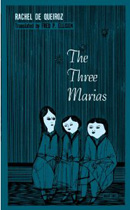
Since reading this novel, I often find myself looking up at the sky trying to place the Three Marias, a constellation of three bright stars at the center of Orion. In the book the three Marias are friends at a convent boarding school in Brazil in the 1930s. Their teacher, Sister Germana, named them after the three heavenly stars because of their evident closeness; they seemed to never leave each others' sides.
The first-person narrator Maria Augusta, or Guta as she prefers to be known, is a courageous and outspoken 12-year-old. But when she first sets foot in the convent school, an overwhelming sense of fear and anguish assails her. Thankfully she is quickly rescued by Maria José, who takes her under her wing and promptly introduces her to Maria Glória, a colorful character given to an entertaining sense of drama.
This is the start to a friendship that will endure for a lifetime. The girls live a cloistered existence in the convent, and long for life and love in the real world. When Glória falls in love (on the sly) for the first time, in keeping with her fervent personality, she shares all the delectable details of the romance with her two dear friends who then also "fall in love" with the young man they have never seen. And, of course, when the romance ends they are all equally heartbroken!
The three Marias have very different personalities and each goes on to seek a distinct path in life, but they are tied together by the thread of their special friendship. De Quieroz, the grand dame of Brazilian literary society, explores mainly love, but also grief and pain via her three principal characters. When The Three Marias was written, in 1939, it was a radical novel. De Quieroz grappled with the status and role of Brazilian women in society. Guta is a rebel. After being confined for so long in the school, her only aspiration is freedom and prohibited pleasures. Her friends describe her as "a force of nature. Like a rock, like an animal." As a result, her life choices are never popular. And, throughout the novel, there is a deep sadness in her, a yearning for something more. Perhaps what she seeks is a sense of freedom from society's constraints and obligations.
First written in Portuguese, As Três Maria is a definitive Brazilian work, since prescribed to thousands
of Brazilian students. It is wonderful that English readers now have access to it again, since Ellison's
impressive 1963 translation has just been re-issued in the US. The prose is spare and considered, and
Ellison's translation successfully captures the author's acknowledged flair and graceful simplicity.

Univ. of Texas Press, paperback, 9780292780798
